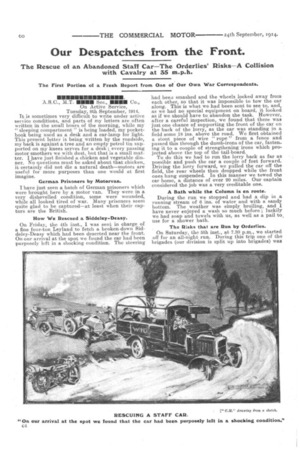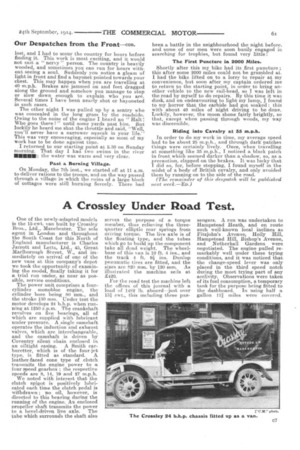Our Despatches from the Front.
Page 4

Page 5

If you've noticed an error in this article please click here to report it so we can fix it.
The Rescue oi an Abandoned Staff Car—The Orderlies' Risks—A Collision with Cavalry at 55 m.p.h.
The First Portion of a Fresh Report from One of Our Own War Correspondents.
A.S.C., M.T. EMI See., IEEE Co., On Active Service, Tuesday, 8th September, 1914. It is sometimes very difficult to write under active service conditions, and parts of my letters are often written in the small hours of the morning, while my "sleeping compartment" is being loaded, my pocketbook being used as a desk and a ear-lamp for light. This present letter is being written by the roadside, my back is against a tree and an empty petrol tin supported on my knees serves for a desk ; every passing motor smothers we with dust, but that is a small matter. I have just finished a chicken and vegetable dinner. No questions must be asked about that chicken, it certainly did not die a natural death—motors are useful for more purposes than one would at first imagine.
German Prisoners by Motorvan.
I have just seen a batch of German prisoners which were brought here by a motor van. They were in a very dishevelled condition, some were wounded, while all looked tired of war. Many prisoners seem quite glad to be captured—at least when their captors are the British.
How We Rescued a Siddeley-Deasy.
On Friday, the 4th inst., I was sent in charge of a fine four-ton Leyland to fetch a broken-down Siddeley-Deasy which had been deserted near the front. On our arrival at the spot we found the car had been purposely left in a shocking condition. The steering
had been smashed and the wheels locked away from each other, so that it was impossible to tow the car along. This is what we had been sent to see to, and, as we had no special equipment on board, it looked as if we should have to abandon the task. However, after a careful inspection,. we found that there was just one chance of supporting the front of the car on the back of the lorry, as the car was standing in a field some 18 ins, above the road. We first obtained a stout piece of wire " rope " from a fence and passed this through the dumb-irons of the car, fasten. mg it to a couple of strengthening irons which projected above the top of the tail-board. To do this we had to run the lorry back as far as possible and push the car a couple of feet forward. Driving the lorry forward, we pulled the car off the field, the rear wheels then dropped while the front ones hung suspended. In this manner we towed the car home, a distance of over 20 miles. Our captain considered the job was a very creditable one.
A Bath while the Column is en route.
During the run we stopped and had a dip in a running stream of 6 ins, of water and with a sandy bottom. The weather was simply broiling, and I have never enjoyed a wash so much before ; luckily we had soap and towels with us, as well as a pail to use for a shower bath.
The Risks that are Run by Orderlies.
On Saturday, the 5th inst., at 7.20 p.m., we started off for an all-night run. During this trip one of the brigades (our division is split up into brigades) was lost, and I had to scour the country for hours before finding it. This work is most exciting, and it would not suit a " nervy " person. The country is heavily wooded, and sometimes you can run for hours without seeing a soul. Suddenly you notice a gleam of light in front and find a bayonet pointed towards your chest. This may happen when you are travelling at 40 mph. Brakes are jammed on and feet dragged along the ground and somehow you manage to stop or Slow down enough to explain who you are. Several times I have been nearly shot or bayoneted in such cases.
The other night I was pulled up by a sentry who was concealed in the long grass by the roadside. Owing to the noise of the engine I heard no "Halt ! Who goes there?" until some yards past him. But luckily he heard me shut the throttle and said, "Well, you'll never have a narrower squeak in your life.– This was very encouraging, especially as most of my work has to be done against time.
I returned to our starting point at 5.30 on Sunday morning. That day I had two swims in the river 11111./.11; the water was warm and very clear.
Past a Burning Village.
On Monday, the 7th inst., we started off at 11 }1.111. to deliver rations to the troops, and on the way passed through a village in which the ruins of a large block of cottages were still burning fiercely. There had been a battle in the neighbourhood the night before, and some of our men were soon busily engaged in searching for trophies, but found very little 1 The First Puncture in 2000 Miles.
Shortly after this my bike had its first puncture ; this after some 2000 miles could not be grumbled at. I had the bike lifted on to a lorry to repair at my convenience, but soon after my captain ordered me to return to the starting point, in order to bring another vehicle to the new rail-head, so I was left in the road by myself to do repairs. By this time it was dusk, and on endeavouring to light my lamp, I found to my horror that the carbide had got soaked : this with about 40 miles of night driving to be done. Luckily, however, the moon shone fairly brightly, so that, except when passing through woods, my way was discernible.
Riding into Cavalry at 35 m.p.h.
in order to do my work in time, my average speed had to be about 25 m.p.h., and through dark patches things were certainly lively. Once, when travelling at something like 35 m.p.h., I noticed a black patch in front which seemed darker than a shadow, so, as a precaution, clapped on the brakes. It was lucky that did so, for, before stopping, I found myseif in the midst of a body of British cavalry, and only avoided them by running on to the side of the road. (The remainder of this despatch will be published next week.—En.)




















